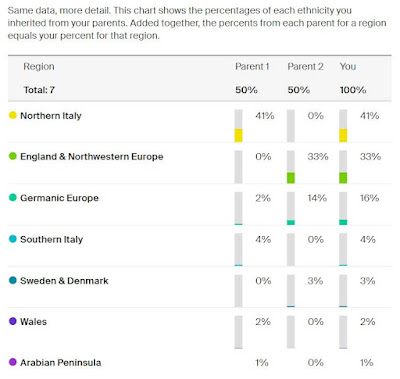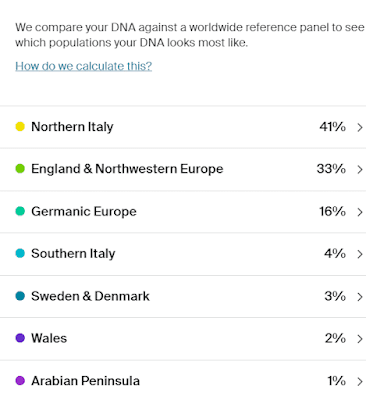In previous posts, I criticized Ancestry.com for its painfully poor job of identifying the DNA patterns of Tuscan Italians, labeling many of us as more French than Italian—but I am blown away by the vast improvements in the upgraded algorithms that were revealed this month. The accuracy is astounding!
I can say this with confidence because I have done a
ton of traditional genealogical research and have found birth records for every
ancestor on the Italian side of the family going back to all 16 of my third Italian
great grandparents. Each one was born in the same valley in Italy, the
Valdinievole (roughly between Lucca and Montecatini), or just a few miles away.
This is region that has seen little population influx over the centuries, being
inland and located on rich farmland that has often been passed down through the
centuries. All of these ancestors’ surnames are common to our little region of
Tuscany.
My dad and his six siblings were born to Michele
Spadoni and Anita Seghieri, who grew up only a few miles from each other, in
Pescia and Montecarlo, respectively. By traditional genealogical standards,
they would be considered full blooded Tuscan Italians. Dad married a
non-Italian, as did his siblings, so I and my first cousins always considered
ourselves half Italian. But prior to Ancestry’s upgrade, none of us tested more
than 11% Italian. One tested 0 percent Italian and 45% French.
Even more glaringly false were the DNA results of three
cousins who were the offspring of two parents from the Valdinievole, so by
traditional standards they should be 100% Tuscan Italian. By Ancestry’s former DNA
algorithms, Anna Giuntoli was 51% French and 49% Italian. Joan Seghieri was
classified as 50% Italian, 44% French and 6% Greek/Balkan. Vilma Ferranti showed
as 44% French and 54% Italian.
The changes with the new formula are dramatic—and strikingly
accurate. Anna is now listed as 78% Northern Italian and 8% French, while Joan
is 97% Northern Italian and Vilma is 93% Northern Italian and 4% Southern
Italian. Joan and Vilma no longer show any French ethnicity.

This is the map of Northern Italy that Ancestry
provides. I've put a red dot where most of my
ancestors have lived for many centuries.
Just as impressive are the results for me, my siblings
and my first cousins. Combining the Northern Italian with a touch of Southern
Italian, I’m now listed as 45% Italian overall. My sister Linda is at 47% and brother
Roger is 39%. Cousin Gary, who was once listed by Ancestry as 0% Italian, now
comes in at a surprising 50%. Annette also is adjudged at 50% Italian, while
her sister Susan is close behind at 47%.
Also impressive is an entirely new feature, which attempts
(and seemingly succeeds dramatically) to show from which parent a person
obtained his or her ethnicity results. I can’t fathom how the scientists at
Ancestry can tell this without testing our parents, but the results are
amazingly accurate when compared with my genetic research. The breakdown shows
that all of the Italian ethnicity I and my siblings received is from our dad,
while the English and Dutch/German is from our mom.

Parent 1 is my dad, Giulio (Julius) Spadoni, born of parents
with deep roots in Tuscany. Mom's parents were a mix of
primarily Dutch, English and German ancestry.
The only results that seem a bit off are for the next
two generations below us. By traditional methods, my children and those of my
first cousins would be considered 25% Italian, but the only two who have been
tested come in at 10% and 21%. Two of my brother’s grandchildren have been
tested, and they come out as 0% and 2% Italian, while they would be considered
12.5% by traditional standards.
I previously expressed strong disappointment and
disapproval with Ancestry for its flawed formulas and results regarding Northern
Italian ancestry. Now I’m amazed and impressed to the same degree with the
dramatic improvements. Complimenti, Ancestry! Avete fatto bene!
------------------------------
Here is the previous post I made, stating how
inaccurate Ancestry was in the past:


Finally, they realized Northern Italy is not France
ReplyDeleteWell, sort of, but some improvement is better than none, and I'm glad that it works for you. However clever the algorithms, the computation of ethnicity will be blindered if the data are too sparse, which still seems to be at issue in my case, where my genealogy is 25% from 3 remote and adjacent Ligurian villages in the Val Fontanabuona, going back to 3d GGPs. But the current algorithm has me at 14% N. Italy (and the balance of the 25% is, yes, French), which is at least better than the former 0% which they assigned me!
Delete